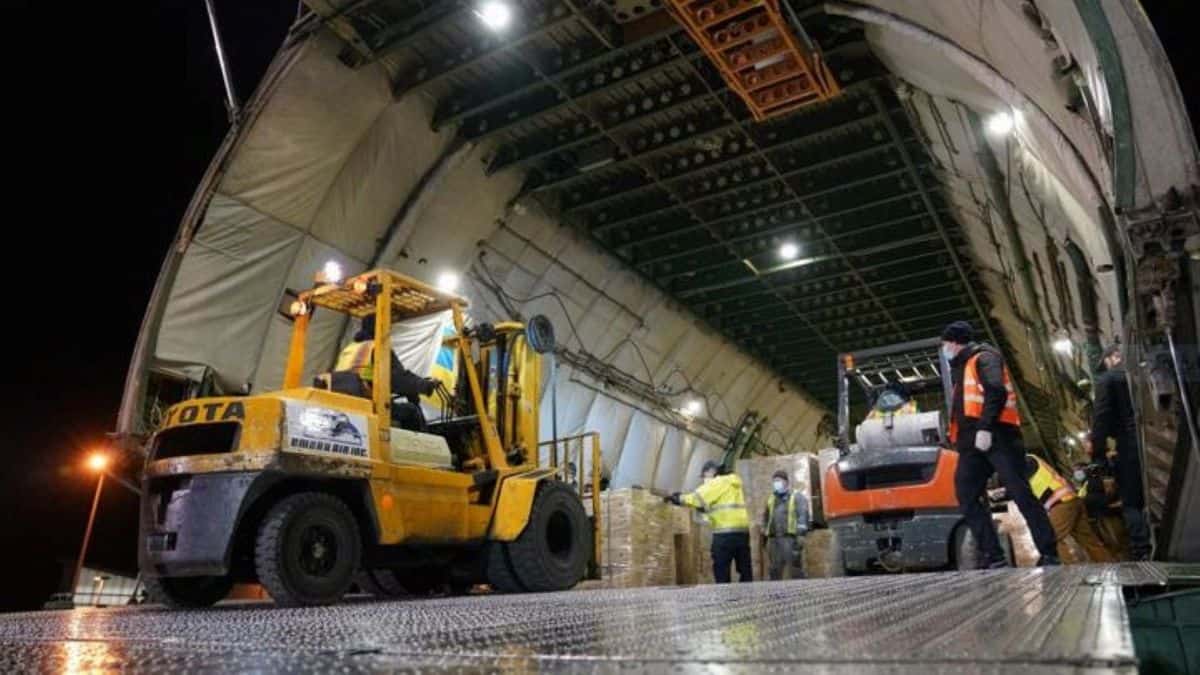(Updated 7:05 P.M. EST, with FEMA details)
The frequency of freighter aircraft transporting emergency supplies to the U.S. from overseas continues to grow in support of government and private-sector relief efforts for coronavirus prevention and treatment.
Project Airbridge, the airlift organized by the Federal Emergency Management Agency (FEMA) to expedite delivery of medical supplies for health care distributors, has already completed 55 flights since March 29, with 444 more scheduled to arrive in the coming days and weeks, according to the latest information from the agency. One of the flights, for example, is bringing 7,500 COVID-19 test kits manufactured in South Korea under contract with FEMA. Each kit has the ability to test 100 people.
Vice President Mike Pence said at a White House briefing this week that the average daily flight is carrying 22 million face masks, building up the average seven-day inventory to 80 million masks. Overall, more than 550 million items of protective personal equipment has been delivered from overseas manufacturers, according to FEMA.
New airports are also being added to the mix as the flight tempo picks up. This week a Russian cargo plane landed at Rockford International Airport, located about an hour’s drive west of Chicago, with N-95 respirators, surgical masks, gloves and gowns, according to FEMA.
Ken Ryan, the airport’s director of cargo business development, said Antonov Airlines operated the flight using a heavylift AN-124 aircraft. The shipment went to a warehouse in Elk Grove, near O’Hare International Airport, for distribution. Rockford, which has seen huge growth in cargo business the past two years, has been told to expect more FEMA flights, but there is no schedule yet, Ryan said.
Project Airbridge is also using the following airports as import gateways: Chicago O’Hare; New York JFK; Miami; Louisville, Los Angeles; Dallas Fort-Worth and Columbus, Ohio (Rickenbacker).
UPS said it has added more than 200 flights in April, using its own fleet and chartered freighters, to support Project Airbridge and other health care-related missions. The vast majority of flights are from Asia to the U.S. and Europe.
UPS is supporting FEMA and the U.S. Department of Health and Human Services in multiple ways, including warehousing, distribution and parcel delivery of test kits. The integrated logistics company is also supporting public health agencies worldwide with the shipment of vital health care equipment, including the recent shipment of ventilators to the UK’s National Health Service.
On Tuesday, UPS announced it is working with Qiagen, a provider of molecular diagnostics and sample preparation technologies, to deliver nucleic acid extraction kits critical to COVID-19 testing, as well as testing cartridges around the world. The testing kits are produced at Qiagen’s plant in Hilden, Germany.
Atlas Air, which also is heavily involved in Project Airbridge, said Thursday it donated two flights to New York University’s Langone Health in the past week. The flights from Shanghai landed at John F. Kennedy International Airport in New York and Chicago O’Hare. On board the Boeing 747-400 freighters were medical gowns, face shields and masks.

Cargo being loaded in Shanghai (Photo: Atlas Air)
“The COVID-19 pandemic has greatly impacted the accessibility of personal protective equipment for healthcare workers at NYU Langone Health, and across the world,” NYU Langone CEO Robert I. Grossman said in a statement. “We extend our heartfelt thanks to Atlas Air for their extraordinary generosity, and for their efforts to ensure that our community is well-equipped in our ongoing battle against COVID-19.”










